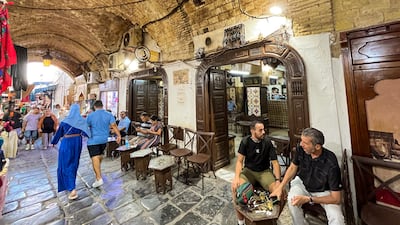The cafes in Tunis Medina, the old city at the heart of Tunisia's capital, are places where everyone must spend some time, whether residents or visitors, students, couples, families or groups of friends.
With a rich history built over centuries, the cafes of the medina are where many Tunisians start and nurture relationships that endure for a lifetime. And apart from their passion for coffee and cafe gatherings, the time spent here is for many the only respite from the cares of daily life.
The main focus of the medina has always been its bazaar, where merchants sell everything from chachias, the traditional round headcaps worn by men, and djebbas, the traditional ankle-length gowns, to silver and gold jewellery.
But the cafes that are now very much a part of its character appeared gradually over the course of its history, opening in even the narrowest of alleyways.

From commerce to coffee shops
“There were no cafes here and they were not even called that," Ali Boukraa, 60, told The National as he sat down for his morning hit of caffeine with his wife at the Chaouachine cafe.
"We called it 'wjaq' [the word for kitchen in old Tunisian dialect], but over the years it became a place where we served coffee,” Mr Boukraa said.
There were wjaqs in each market that initially catered mainly to the merchants who operated in those areas, where they could rest during the day, he said. They began to be called cafes from the 1970s, as they became popular among people from outside the markets.
Mr Boukraa started working at the Chaouchin cafe – which has been in existence since 1646 – at the age of 18. He took over the business after his father passed away but he insisted on keeping the same concept that has been built over generations.
“This is the chaouchia market [where the chachia makers work], it is the navel of medina, so of course people would yearn for it if they do not visit it for a long time,” he said.

Not all the medina's cafes have such a long a history, but they do strive to hold on to their character.
At the Zitouna cafe, waiter Mehrez Hassni said the decor and concept have not changed since the 1990s.
“I’ve worked here since this cafe opened in 1991. People like it here because it is open and on the main alleyway that takes visitors through the souq,” Mr Hassni told The National as a song by the late Syrian singer Sabah Fakhri blasted from a small radio on the counter.
“Tunisians have only cafes to go to – what other activities do we have? We just love it,” he said.
Spending time at cafes is a tradition that has persisted through generations in Tunisia, and it is not only about the coffee.
Bonding over a brew
The cafes are the first public gathering places most high school pupils start to frequent as they come of age. Adding to the attraction of the medina's cafes is the variety of affordable dishes on offer if visitors explore its labrynthine alleyways.
“I saw women and men start their relationships here and come back as married couples, I saw children grow before my eyes and become adults. It always warms my heart to see them come back to this place,” said Manoubi Bouchaira, 65, who has owned a cafe in the chaouchia market since 2006.
Born in Beb Jdid, a neighbourhood north of the medina, and educated at the Zitouna mosque, Mr Bouchaira started out working as a butcher in the medina alongside his father, a trade passed down through the family for generations. But when the opportunity arose to buy a cafe, he did not hesitate.
“The walls of this place could tell us many stories, people grow fond of not only this place but also of each other,” he said.

Dorsaf Ouergheli and Nozha Zouaoui, friends for more than 20 years, met at the Mrabet cafe in the medina when they were university students.
The two women were both majoring in humanities, but at different colleges that were near by, and came to the medina almost every day to sit down with friends and exchange thoughts on a range of topics over a cup of tea or coffee.
"We had common friends and this place gave people from different schools the chance to mingle," Mrs Zouaoui told The National.
Since they were both from outside Tunis, they enjoyed discovering life in the capital together. In difficult times, they were each other's support system, they said.
Even though they now have separate lives, they keep coming back to the Mrabet cafe to catch up and reminisce.
"We just love it here , it is calm and has a charm of its own. It is one of those places that resisted change and kept its traditional character," Mrs Ouergheli said.
"We could even lie down if we wanted to, it is that comfortable."


